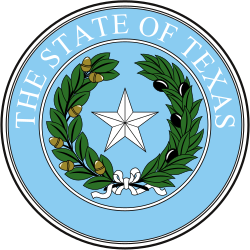August 3, 1857 | |||||||||||||||||
| |||||||||||||||||
 County Results
| |||||||||||||||||
| |||||||||||||||||
| Elections in Texas |
|---|
 |
The 1857 Texas gubernatorial election was held on August 3, 1857, to elect the governor of Texas. The election pitted Lieutenant Governor Hardin Richard Runnels and Lieutenant Governor candidate Francis Lubbock against former President of the Republic of Texas Sam Houston and Lieutenant Governor hopeful Jesse Grimes. Runnels won the election with 57% of the vote, becoming the only person to ever defeat Sam Houston in a political contest.
Contents
Runnels had won the Democratic party's nomination as a southern fire-eater and along with his candidate for Lieutenant Governor, Francis Lubbock they were generally considered the more radical ticket. Many of the Prominent Newspapers backed Runnels for the governorship with twenty-eight of them supporting Runnels, nine supporting Houston, and a few others were undecided, one Tyler paper declared, “The few Houston men in our ranks can do no harm; they cannot help him out of the ditch.”
Houston was the Class 2 Senator from Texas at the time and had earned the ire of many of his statesmen because of his opposition to the Kansas-Nebraska Act, and insistence on preservation of the Union above all else. Houston campaigned tirelessly, making over 60 speeches, Houston campaigned heavily in East Texas in the summer of 1857, traveling in a buggy and speaking in Gilmer, Marshall, Henderson, Rusk and Tyler, among many other Piney Woods villages.
A lot of Texans were less than pleased with Houston and his politics. One anti-Houston newspaper noted Sam “spoke nearly three hours. His speech was a compound of abuse and egotism. Abusive without the merit of wit or sarcasm and egotistical without the sanction of historical truth.”
On election night Houston was defeated by over 15%, the Democratic party interpreted this as a mandate to take an extreme stand and Runnels' course differed from that of outgoing governor, Elisha Pease. He issued ultimatums to the national government and threatened secession if his demands were not met. In his inaugural address, he demanded that Kansas be admitted as a slave state and warned that if this demand was not met the South would be justified in seceding from the Union. The slavery issue dominated state politics, but Runnels found his most pressing problem was Native Americans on the warpath. It was during his administration that the Texas Rangers were reorganized and strengthened to fight the Comanches and Kiowas.
However, many Texans were hesitant about the Democrats sudden embrace of Radicalism and Disunion, in particular its attempt to add reopening of the Trans-Atlantic Slave Trade to the party platform, as well as the increase in Indian hostilities on the frontier and in the next Gubernatorial election Sam Houston was able to defeat Runnels by a similar margin. [1] [2]

